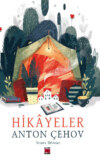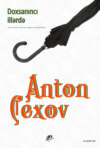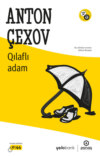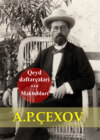Kitabı oku: «Letters of Anton Chekhov to His Family and Friends», sayfa 24
MOSCOW,
February 8, 1897.
The census is over. I was pretty sick of the business, as I had both to enumerate and to write till my fingers ached, and to give lectures to fifteen numerators. The numerators worked excellently, with a pedantic exactitude almost absurd. On the other hand the Zemsky Natchalniks, to whom the census was entrusted in the districts, behaved disgustingly. They did nothing, understood little, and at the most difficult moments used to report themselves sick. The best of them turned out to be a man who drinks and draws the long bow a la Hlestakov [Translator’s Note: A character in Gogol’s “Inspector General.”] – but was all the same a character, if only from the point of view of comedy, while the others were colourless beyond words, and it was annoying beyond words to have anything to do with them.
I am in Moscow at the Great Moscow Hotel. I am staying a short time, ten days, and then going home. The whole of Lent and the whole of April after it, I shall have to be busy again with carpenters and so on. I am building a school again. A deputation came to me from the peasants begging me for it, and I had not the courage to refuse. The Zemstvo is giving a thousand roubles, the peasants have collected three hundred, and that is all, while the school will not cost less than three thousand. So again I shall have all the summer to be thinking about money, and scraping it together here and there. Altogether life in the country is full of work and care…
The police have made a raid upon Tchertkov, the well-known Tolstoyan, have carried off all that the Tolstoyans had collected relating to the Duhobors and sectarians – and so all at once as though by magic all evidence against Pobyedonostsev and his angels has vanished. Goremykin called upon Tchertkov’s mother and said: “Your son must make the choice – either the Baltic Province where Prince Hilkov is already living in exile, or a foreign country.” Tchertkov has chosen London.
He is setting off on the thirteenth of February. L. N. Tolstoy has gone to Petersburg to see him off; and yesterday they sent his winter overcoat after him. A great many are going to see him off, even Sytin, and I am sorry that I cannot do the same. I don’t cherish tender sentiments for Tchertkov, but the way he has been treated fills me with intense, intense indignation…
MOSCOW,
April 1, 1897.
The doctors have diagnosed tuberculosis in the upper part of the lungs, and have ordered me to change my manner of life. I understand their diagnosis but I don’t understand their prescription, because it is almost impossible. They tell me I must live in the country, but you know living permanently in the country involves continual worry with peasants, with animals, with elementary forces of all kinds, and to escape from worries and anxieties in the country is as difficult as to escape burns in hell. But still I will try to change my life as far as possible, and have already, through Masha, announced that I shall give up medical practice in the country. This will be at the same time a great relief and a great deprivation to me. I shall drop all public duties in the district, shall buy a dressing-gown, bask in the sun, and eat a great deal. They tell me to eat six times a day and are indignant with me for eating, as they think, very little. I am forbidden to talk much, to swim, and so on, and so on.
Except my lungs, all my organs were found to be healthy. Hitherto I fancied I drank just so much as not to do harm; now it turns out on investigation that I was drinking less than I was entitled to. What a pity!
The author of “Ward No. 6” has been moved from Ward No. 16 to Ward No. 14. There is plenty of room here, two windows, lighting a la Potapenko, three tables. There is very little haemorrhage. After the evening when Tolstoy was here (we talked for a long time) at four o’clock in the morning I had violent haemorrhage again.
Melihovo is a healthy place; it stands exactly on a watershed, on high ground, so that there is never fever or diphtheria in it. They have decided, after general consultation, that I am not to go away anywhere but to go on living at Melihovo. I must only arrange the house somewhat more comfortably…
MOSCOW,
April 7, 1897.
… You write that my ideal is laziness. No, it is not laziness. I despise laziness as I despise weakness and lack of mental and moral energy. I was not talking of laziness but of leisure, and I did not say leisure was an ideal but only one of the essential conditions of personal happiness.
If the experiments with Koch’s new serum give favourable results, I shall go of course to Berlin. Feeding is absolutely no use to me. Here for the last fortnight they have been feeding me zealously, but it’s no use, I have not gained weight.
I ought to get married. Perhaps a cross wife would cut down the number of my visitors by at least a half. Yesterday they were coming all day long, it was simply awful. They came two at a time – and each one begs me not to speak and at the same time asks me questions…
TO A. I. ERTEL
MELIHOVO, April 17, 1897.
DEAR FRIEND ALEXANDR IVANOVITCH,
I am now at home. For a fortnight before Easter I was lying in Ostroumov’s clinic and was spitting blood. The doctor diagnosed tuberculosis in the lungs. I feel splendid, nothing aches, nothing is uneasy inside, but the doctors have forbidden me vinum, movement, and conversation, they have ordered me to eat a great deal, and forbidden me to practise – and I feel as it were dreary.
I hear nothing about the People’s Theatre. At the congress it was spoken of apathetically, without interest, and the circle that had undertaken to write its constitution and set to work have evidently cooled off a little. It is due to the spring, I suppose. The only one of the circle I saw was Goltsev, and I had not time to talk to him about the theatre.
There is nothing new. A dead calm in literature. In the editor’s offices they are drinking tea and cheap wine, drinking it without relish as they walk about, evidently from having nothing to do. Tolstoy is writing a little book about Art. He came to see me in the clinic, and said that he had flung aside his novel “Resurrection” as he did not like it, and was writing only about Art, and had read sixty books about Art. His idea is not a new one; all intelligent old men in all the ages have sung the same tune in different keys. Old men have always been prone to see the end of the world, and have always declared that morality was degenerating to the uttermost point, that Art was growing shallow and wearing thin, that people were growing feebler, and so on, and so on.
Lyov Nikolaevitch wants to persuade us in his little book that at the present time Art has entered upon its final phase, that it is in a blind alley, from which it has no outlet (except retreat).
I am doing nothing, I feed the sparrows with hemp-seed and prune a rose-tree a day. After my pruning, the roses flower magnificently. I am not looking after the farming.
Keep well, dear Alexandr Ivanovitch, thank you for your letter and friendly sympathy. Write to me for the sake of my infirmity, and don’t blame me too much for my carelessness in correspondence.
In future I am going to try and answer your letters as soon as I have read them. Warmest greetings.
TO SUVORIN
MELIHOVO, July 12, 1897.
… I am reading Maeterlinck, I have read his “Les Aveugles,” “L’Intrus,” and am reading “Aglavaine et Selysette.” They are all strange wonderful things, but they make an immense impression, and if I had a theatre I should certainly stage “Les Aveugles.” There is, by the way, a magnificent scenic effect in it, with the sea and a lighthouse in the distance. The public is semi-idiotic, but one might avoid the play’s failing by writing the contents of the play – in brief, of course – on the programme, saying the play is the work of Maeterlinck, a Belgian author and decadent, and that what happens in it is that an old man, who leads about some blind men, has died in silence and that the blind men, not knowing this, are sitting and waiting for his return…
TO MADAME AVILOV
NICE, October 6, 1897.
… You complain that my heroes are gloomy – alas! that’s not my fault. This happens apart from my will, and when I write it does not seem to me that I am writing gloomily; in any case, as I work I am always in excellent spirits. It has been observed that gloomy, melancholy people always write cheerfully, while those who enjoy life put their depression into their writings. And I am a man who enjoys life; the first thirty years of my life I have lived as they say in pleasure and content…
TO F. D. BATYUSHKOV
NICE, December 15, 1897.
… In one of your letters you expressed a desire that I should send you an international story, taking for my subject something from the life here. Such a story I can write only in Russia from reminiscences. I can only write from reminiscences, and I have never written directly from Nature. I have let my memory sift the subject, so that only what is important or typical is left in it as in a filter…
TO A. S. SUVORIN
NICE, January 4, 1898.
… Judging from the extract printed in Novoye Vremya, Tolstoy’s article on Art does not seem interesting. All that is old. He says about Art that it is decrepit, that it has got into a blind alley, that it is not what it ought to be, and so on, and so on. That’s just like saying the desire to eat and drink has grown old, has outlived its day, and is not what it ought to be. Of course hunger is an old story, in the desire to eat we have got into a blind alley, but still eating is necessary, and we shall go on eating however the philosophers and irate old men moralise…
TO F. D. BATYUSHKOV
NICE, January 28, 1898.
… We talk of nothing here but Zola and Dreyfus. The immense majority of educated people are on Zola’s side and believe that Dreyfus is innocent. Zola has gained immensely in public esteem; his letters of protest are like a breath of fresh air, and every Frenchman has felt that, thank God! there is still justice in the world, and that if an innocent man is condemned there is still someone to champion him. The French papers are extremely interesting while the Russian are worthless. Novoye Vremya is simply loathsome…
TO A. S. SUVORIN
NICE, February 6, 1898.
… You write that you are annoyed with Zola, and here everyone has a feeling as though a new, better Zola had arisen. In his trial he has been cleansed as though in turpentine from grease-spots, and now shines before the French in his true brilliance. There is a purity and moral elevation that was not suspected in him. You should follow the whole scandal from the very beginning. The degradation of Dreyfus, whether it was just or not, made on all (you were of the number I remember) a painful and depressing impression. It was noticed that at the time of the sentence Dreyfus behaved like a decent well-disciplined officer, while those present at the sentence, the journalists for instance, shouted at him, “Hold your tongue, Judas,” – that is, behaved badly and indecently. Everyone came back from the sentence dissatisfied and with a troubled conscience. Dreyfus’ counsel Demange, an honest man, who even during the preliminary stages of the trial felt that something shifty was being done behind the scenes, was particularly dissatisfied – and then the experts who, to convince themselves that they had not made a mistake, kept talking of nothing but Dreyfus, of his being guilty, and kept wandering all over Paris! …
Of the experts one turned out to be mad, the author of a monstrously absurd project; two were eccentric creatures.
People could not help talking of the Intelligence Department at the War Office, that military consistory which is employed in hunting for spies and reading other people’s letters; it began to be said that the head of that Department, Sandhen, was suffering from progressive paralysis; Paty de Clam has shown himself to be something after the style of Tausch of Berlin; Picquart suddenly took his departure mysteriously, causing a lot of talk. All at once a series of gross judicial blunders came to light. By degrees people became convinced that Dreyfus had been condemned on the strength of a secret document, which had been shown neither to the accused man nor his defending counsel, and decent law-abiding people saw in this a fundamental breach of justice. If the latter were the work not simply of Wilhelm, but of the centre of the solar system, it ought to have been shown to Demange. All sorts of guesses were made as to the contents of this letter, the most impossible stories circulated. Dreyfus was an officer, the military were suspect; Dreyfus was a Jew, the Jews were suspect. People began talking about militarism, about the Jews. Such utterly disreputable people as Drumont held up their heads; little by little they stirred up a regular pother on a substratum of anti-semitism, on a substratum that smelt of the shambles. When something is wrong with us we look for the causes outside ourselves, and readily find them. “It’s the Frenchman’s nastiness, it’s the Jews’, it’s Wilhelm’s.” Capital, brimstone, the freemasons, the Syndicate, the Jesuits – they are all bogeys, but how they relieve our uneasiness! They are of course a bad sign. Since the French have begun talking about the Jews, about the Syndicate, it shows they are feeling uncomfortable, that there is a worm gnawing at them, that they feel the need of these bogeys to soothe their over-excited conscience.
Then this Esterhazy, a duellist, in the style of Turgenev’s duellists, an insolent ruffian, who had long been an object of suspicion, and was not respected by his comrades; the striking resemblance of his handwriting with that of the bordereau, the Uhlan’s letters, his threats which for some reason he does not carry out; finally the judgment, utterly mysterious, strangely deciding that the bordereau was written in Esterhazy’s handwriting but not by his hand! … And the gas has been continually accumulating, there has come to be a feeling of acute tension, of overwhelming oppression. The fighting in the court was a purely nervous manifestation, simply the hysterical result of that tension, and Zola’s letter and his trial are a manifestation of the same kind. What would you have? The best people, always in advance of the nation, were bound to be the first to raise an agitation – and so it has been. The first to speak was Scherer-Kestner, of whom Frenchmen who know him intimately (according to Kovalevsky) say that he is a “sword-blade,” so spotless and without blemish is he. The second is Zola, and now he is being tried.
Yes, Zola is not Voltaire, and we are none of us Voltaires, but there are in life conjunctions of circumstances when the reproach that we are not Voltaires is least of all appropriate. Think of Korolenko, who defended the Multanovsky natives and saved them from penal servitude. Dr. Haas is not a Voltaire either, and yet his wonderful life has been well spent up to the end.
I am well acquainted with the case from the stenographers’ report, which is utterly different from what is in the newspapers, and I have a clear view of Zola. The chief point is that he is sincere – that is, he bases his judgments simply on what he sees, and not on phantoms like the others. And sincere people can be mistaken, no doubt of it, but such mistakes do less harm than calculated insincerity, prejudgments, or political considerations. Let Dreyfus be guilty, and Zola is still right, since it is the duty of writers not to accuse, not to prosecute, but to champion even the guilty once they have been condemned and are enduring punishment. I shall be told: “What of the political position? The interests of the State?” But great writers and artists ought to take part in politics only so far as they have to protect themselves from politics. There are plenty of accusers, prosecutors, and gendarmes without them, and in any case, the role of Paul suits them better than that of Saul. Whatever the verdict may be, Zola will anyway experience a vivid delight after the trial, his old age will be a fine old age, and he will die with a conscience at peace, or at any rate greatly solaced. The French are very sick. They clutch at every word of comfort and at every genuine reproach coming to them from outside. That is why Bernstein’s letter and our Zakrevsky’s article (which was read here in the Novosti) have had such a great success here, and why they are so disgusted by abuse of Zola, such as the gutter press, which they despise, flings at him every day. However neurotic Zola may be, still he stands before the court of French common sense, and the French love him for it and are proud of him, even though they do applaud the Generals who, in the simplicity of their hearts, scare them first with the honour of the army, then with war…
TO HIS BROTHER ALEXANDR
NICE, February 23, 1898.
… Novoye Vremya has behaved simply abominably about the Zola case. The old man and I have exchanged letters on the subject (in a tone of great moderation, however), and have both dropped the subject.
I don’t want to write and I don’t want his letters, in which he keeps justifying the tactlessness of his paper by saying he loves the military: I don’t want them because I have been thoroughly sick of it all for a long time past. I love the military too, but I would not if I had a newspaper allow the cactuses to print Zola’s novel for nothing in the Supplement, while they pour dirty water over this same Zola in the paper – and what for? For what not one of the cactuses has ever known – for a noble impulse and moral purity. And in any case to abuse Zola when he is on his trial – that is unworthy of literature…
TO HIS BROTHER MIHAIL
YALTA, October 26, 1898.
… I am buying a piece of land in Yalta and am going to build so as to have a place in which to spend the winters. The prospect of continual wandering with hotel rooms, hotel porters, chance cooking, and so on, and so on, alarms my imagination. Mother will spend the winter with me. There is no winter here; it’s the end of October, but the roses and other flowers are blooming freely, the trees are green and it is warm.
There is a great deal of water. Nothing will be needed apart from the house, no outbuildings of any sort; it will all be under one roof. The coal, wood and everything will be in the basement. The hens lay the whole year round, and no special house is needed for them, an enclosure is enough. Close by there is a baker’s shop and the bazaar, so that it will be very cosy for Mother and very convenient. By the way, there are chanterelles and boletuses to be gathered all the autumn, and that will be an amusement for Mother. I am not doing the building myself, the architect is doing it all. The houses will be ready by April. The grounds, for a town house, are considerable. There will be a garden and flowerbeds, and a vegetable garden. The railway will come to Yalta next year…
As for getting married, upon which you are so urgent – what am I to say to you? To marry is interesting only for love; to marry a girl simply because she is nice is like buying something one does not want at the bazaar solely because it is of good quality.
The most important screw in family life is love, sexual attraction, one flesh, all the rest is dreary and cannot be reckoned upon, however cleverly we make our calculations. So the point is not in the girl’s being nice but in her being loved; putting it off as you see counts for little…
My “Uncle Vanya” is being done all over the province, and everywhere with success. So one never knows where one will gain and where one will lose; I had not reckoned on that play at all…
TO GORKY
YALTA, December 3, 1898.
Your last letter has given me great pleasure. I thank you with all my heart. “Uncle Vanya” was written long, long ago; I have never seen it on the stage. Of late years it has often been produced at provincial theatres. I feel cold about my plays as a rule; I gave up the theatre long ago, and feel no desire now to write for the stage.
You ask what is my opinion of your stories. My opinion? The talent is unmistakable and it is a real, great talent. For instance, in the story “In the Steppe” it is expressed with extraordinary vigour, and I actually felt a pang of envy that it was not I who had written it. You are an artist, a clever man, you feel superbly, you are plastic – that is, when you describe a thing you see it and you touch it with your hands. That is real art. There is my opinion for you, and I am very glad I can express it to you. I am, I repeat, very glad, and if we could meet and talk for an hour or two you would be convinced of my high appreciation of you and of the hopes I am building on your gifts.
Shall I speak now of defects? But that is not so easy. To speak of the defects of a talent is like speaking of the defects of a great tree growing in the garden; what is chiefly in question, you see, is not the tree itself but the tastes of the man who is looking at it. Is not that so?
I will begin by saying that to my mind you have not enough restraint. You are like a spectator at the theatre who expresses his transports with so little restraint that he prevents himself and other people from listening. This lack of restraint is particularly felt in the descriptions of nature with which you interrupt your dialogues; when one reads those descriptions one wishes they were more compact, shorter, put into two or three lines. The frequent mention of tenderness, whispering, velvetiness, and so on, give those descriptions a rhetorical and monotonous character – and they make one feel cold and almost exhaust one. The lack of restraint is felt also in the descriptions of women (“Malva,” “On the Raft”) and love scenes. It is not vigour, not breadth of touch, but just lack of restraint. Then there is the frequent use of words quite unsuitable in stories of your type. “Accompaniment,” “disc,” “harmony,” such words spoil the effect. You often talk of waves. There is a strained feeling and a sort of circumspection in your descriptions of educated people; that is not because you have not observed educated people sufficiently, you know them, but you don’t seem to know from what side to approach them.
How old are you? I don’t know you, I don’t know where you came from or who you are, but it seems to me that while you are still young you ought to leave Nizhni and spend two or three years rubbing shoulders with literature and literary people; not to learn to crow like the rest of us and to sharpen your wits, but to take the final plunge head first into literature and to grow to love it. Besides, the provinces age a man early. Korolenko, Potapenko, Mamin, Ertel, are first-rate men; you would perhaps at first feel their company rather boring, but in a year or two you would grow used to them and appreciate them as they deserve, and their society would more than repay you for the disagreeableness and inconvenience of life in the capital…













